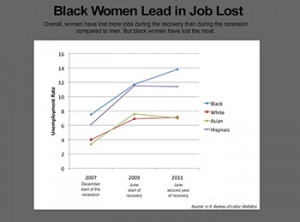Black Women Fall Further Behind During Recovery
During the Great Recession of 2007, millions of Americans lost their jobs. Now, as the US inches its way toward economic recovery, people are trickling their way back to work. But black women, a group that went into the recession with the second highest unemployment rate in the country, only behind black men, are falling further behind.
According to a recent study by the National Women’s Law Center, during the first two years of the recovery period, June 2009 to June 2011, black women lost more jobs than any other demographic, including black men, who have for decades had the highest unemployment rate in the country. In fact, black women lost twice as many jobs as black men gained during the recovery and they now represent more than 4 in every 10 jobs lost by women.
“Part of it is black women, like women in general, are disproportionately employed in the public sector, which has been hard hit by the recession,” said Joan Entmacher, the National Women’s Law Center’s vice president for family economic security. “But on the flip side, black women are also not doing so well in the private sector, so they’re getting hit by job loss on both ends.”
This is a troubling trend for black women, who according to U.S. Census Bureau statistics, make up a majority of the black workforce at 53.4 percent and are the head of households for the majority of black families with children. According to population statistics, 72 percent of black children are born to unmarried mothers.
“The fact that black women are losing more jobs than any other group can have a devastating impact,” said C. Nicole Mason, PhD., executive director and research assistant professor for New York University’s Wagner School. “There’s a disproportionate amount of black women who are single mothers and when they aren’t employed that has a negative impact on families and the community.”
Mason says since black women are the breadwinners of their families, their unemployment has a negative affect on black businesses that rely on the black dollar, as well as on the social and educational development of their children.
According to a 2010 study from the University of Michigan’s National Poverty Center, children of black, single mothers who have been unemployed for an extended period of time were more likely to drop out of school and develop low self-esteem.
Although black women have lost more jobs than any other group, all women have lost more jobs than men during the first two years of the recovery period.
“Women as a whole aren’t doing worse during the recovery than during the recession, but there was no recovery for them” said Entmacher. “They’re pretty much standing still. But black women have clearly taken the biggest hit because they were already behind.”
Current unemployment numbers, show that black women have seen gains in employment. As of October 2011, black women’s unemployment dropped to 12.6 percent from 13.8 percent in June. This is a good sign, but considering the fact that black women, and the black community as a whole, have been plagued with high numbers of unemployment for years, it may not be enough to make a significant difference to the hundreds of thousands of black women seeking employment.
